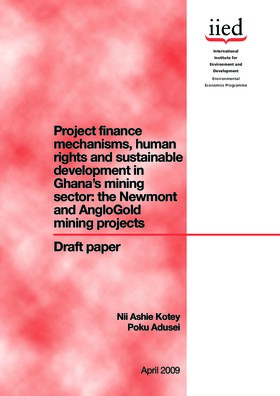Project finance mechanisms, human rights and sustainable development in Ghana's mining sector: the Newmont and AngloGold mining projects

In recent times, firms operating in the extractive industry sectors are increasingly resorting to project finance in place of more conventional methods for financing their operations, such as equity and conventional commercial corporate borrowing. The
obvious advantage of project finance is that the project itself and its assets are used as security for loans advanced to the project. This means that the risks that lenders assume, as well as the liabilities of the project sponsors, are all tied to the project. Thus, lenders cannot, except in highly limited circumstances, have recourse to the assets of project sponsors or shareholders of the firm floating and executing the project in the event of default.
This report explores project finiance issues based on a case study of the Newmont and AngloGold mining projects in Ghana.
What are the links between project finance/foreign direct investment (FDI) and sustainable development and human rights?
2. To what extent does the use of project finance accentuate the positive and negative impacts of FDI on sustainable development and human rights and through which channels?
Cite this publication
Available at https://www.iied.org/g02488